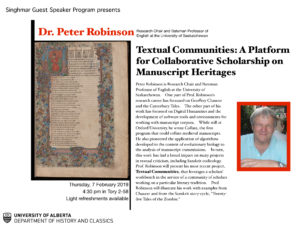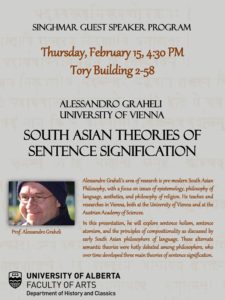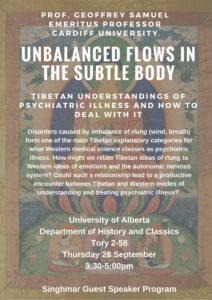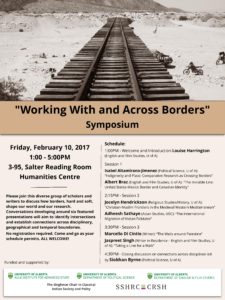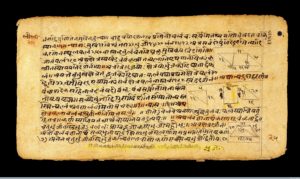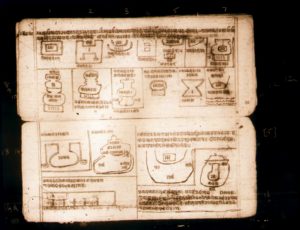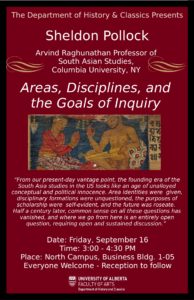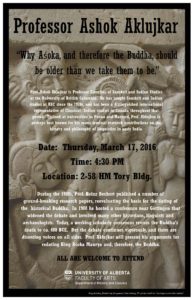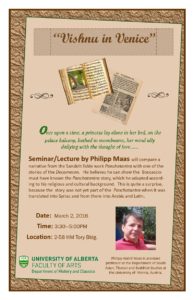January 2023: New Killam Post-doctoral fellow
A warm welcome to Dr Lisa A. Brooks, who joins us this month on coveted Killam Post-Doctoral fellowship. See the “people” page for more information about Dr Brooks’ work.
June 2022: New visiting chair of Indian Studies
The University of Alberta and the Indian Council for Cultural Relations (ICCR) have partnered to create a new Chair of Indian Studies. The agreement was signed in May 2022 during a meeting between U of A’s President and Vice-Chancellor, Prof. Bill Flanagan and His Excellency Ajay Bisaria, High Commissioner of India to Canada in Ottawa.
Click here for further details.
Jan 2020: Announcement:
Canadian South Asian Studies Association 2020 Call for Papers
The Canadian South Asian Studies Association (CSASA), a non-profit scholarly association newly affiliated with the Canadian Federation for the Humanities and Social Sciences, invites proposals for a one-day programme at the Annual Congress meeting, to be held this year at Western University (London, Ontario) on 5 June 2020.
CSASA-L mailing list
CSASA-L@athabascau.ca
https://mailman.athabascau.ca/mailman/listinfo/csasa-l
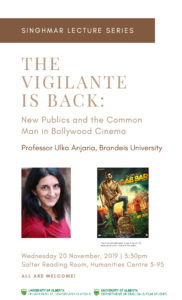 Nov 2019: New Publics and the Common Man in Bollywood Cinema
Nov 2019: New Publics and the Common Man in Bollywood Cinema
Professor Ulka Anjaria, Brandeis University
This movie will be discussed as part of the talk.
Wednesday 20 November, 2019 | 3:30pm
Salter Reading Room, Humanities Centre 3-95
Thursday, October 24, 2019, 4 PM, Room: Tory 2-58
Rewriting Religion & Rescuing Genre: The Evolution of Texts, Gods, and Peoples in the Sanskrit Purāṇas 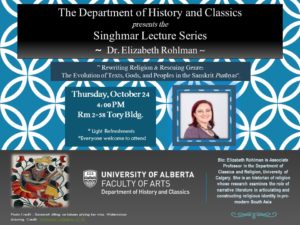
Guest Speaker: Dr. B. Rohlman
Please join the Department of History and Classics in presenting a special guest speaker hosted by the Singhmar Lecture Series.
Elizabeth Rohlman is Associate Professor in the Department of Classics and Religion, University of Calgary. She is an historian of religion whose research examines the role of narrative literature in articulating and constructing religious identity in pre-modern South Asia. Her current research examines the evolution of the Sarasvatī Purāṇa, a Sanskrit text composed, and re-composed, in the western Indian region of Gujarat beginning in the twelfth century. Upcoming research projects include a literary study of the Mārkaṇḍeya Purāṇa and an exploration of the jati purāṇas of Gujarat.
Thursday, October 24, 2019
4 PM
Rm T 2-58
*Light refreshments will be served
*Everyone welcome to attend
The Sanskrit purāṇas—roughly “myth” or “history”—have confounded scholars of Indian literature for millennia. The language used to describe Purāṇas in academic literature and, indeed, in the Sanskrit purāṇas themselves, seems more appropriate to a poorly behaved child than a work of literature: Purāṇas are ungainly. They are disorganized and untidy. The fail to follow their own rule. They repeat themselves ad nauseam. The purāṇas would simply be better if they could only attain the refined language and sophisticated content of the great and celebrated genres of Sanskrit literature.
But what would happen if we reimagined the Purāṇas’ many flaws as features? I argue that the Purāṇas are a genre that uniquely values compositional process over form or content. And once the genre is reclaimed, a new understanding of the evolving nature of religious identity in pre-modern India becomes possible.
Feb 2019
You are invited to a public talk this Thursday 7 Feb 2019 at 4:30pm in Tory 2-58.
Peter Robinson, University of Saskatchewan, will speak on
Textual Communities: A Platform for Collaborative Scholarship on Manuscript Heritages
Peter Robinson is Research Chair and Bateman Professor of English at the University of Saskatchewan. One part of Prof. Robinson’s research career has focussed on Geoffrey Chaucer and the Canterbury Tales. The other part of his work has focussed on Digital Humanities and the development of software tools and environments for working with manuscript corpora. While still at Oxford University, he wrote Collate, the first program that could collate medieval manuscripts. He also pioneered the application of algorithms developed in the context of evolutionary biology to the analysis of manuscript transmissions. In turn, this work has had a broad impact on many projects in textual criticism, including Sanskrit codicology. Prof. Robinson will present his most recent project, Textual Communities, that leverages a scholars’ workbench in the service of a community of scholars working on a particular literary tradition. Prof. Robinson will illustrate his work with examples from Chaucer and from the Sanskrit story-cycle, “Twenty-five Tales of the Zombie.”
May 2018 The Canadian Centre for Ethnomusicology cordially invites you to a lecture-workshop:
Composition and Arrangement in Indian Music, by Mr. Praveen D Rao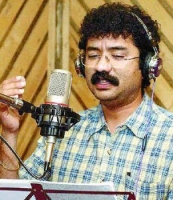
Visiting composer from India, Mr. Praveen D. Rao will be giving a lecture and conducting a workshop on how to compose and arrange Indian music. Mr. Rao is one of the most popular and sought after music directors in India. He has composed music for scores of Indian movies, TV shows and Dance ballets and traveled across the world composing and arranging music in different genres such as Indian classical music, Indi-pop, Indian Jazz, Bollywood, Bharatanatyam, Kathak etc. He has acted in numerous TV shows and movies in lead and supporting roles. You can bring your instruments (both melody and percussion) or sing or just be there to take part in the creative process.
Date: Thursday, 31st May, 2018
Time: 1:30 – 3:00
Venue: Studio 27, Fine Arts Building (map)
All are welcome. Free of charge.
With thanks to Dr. Deepak Paramashivan for arranging this opportunity.
Feb 2018
The philosopher Dr Alessandro Graheli will visit the University of Alberta in early Feb 2018. He will interact with our grad students, and give an open departmental seminar (Thursday 15 Feb at 4:30pm, Dept. History and Classics). Dr Graheli specializes in the analytic linguistic philosophers of early India, with a special focus on the Kashimirian philosopher Jayanta Bhaṭṭa (fl. ca. 900 CE).
- Dr Graheli’s home page at the University of Vienna
- Dr Graheli’s home page at the Austrian Academy of Sciences
Sept 2017 Geoffrey Samuel: “Unbalanced Flows in the Subtle Body”
Disorders caused by rlung-imbalance form one of the main Tibetan explanatory categories for what Western medical science classes as psychiatric illness. Rlung — most often rendered in English as ‘wind’ — translates the Sanskrit term vāta, one of the three doṣas or pathogenic factors within the Ayurvedic medical tradition, and rlung in this sense is one of the three nyes pa, the Tibetan equivalents of the doṣa.
However, the same Tibetan word, rlung, also translates another Sanskrit term, prāṇa. Prāṇa is often rendered into English as breath, but it refers not just to the process of respiration but to a variety of subtle inner ‘flows’ within the body. Yogic or meditational practices involving the manipulation and transformation of these internal flows, the so-called rtsa rlung practices, are a key part of the yogic techniques employed by Buddhist Tantric practitioners in Tibet. This has arguably led to a conflation and mutual influence between these two terms in Tibetan thought.
In this paper I introduce rlung disorders in Tibetan medicine, and discuss whether and how we might relate Tibetan ideas of rlung to Western ideas of emotions and the autonomic nervous system. Could such a relationship lead to a productive encounter between Tibetan and Western modes of understanding and treating psychiatric illness?
- When: Thursday 28 September 2017, 3:30 – 5:00 pm
- Where: Tory Building, 2-58
- All welcome
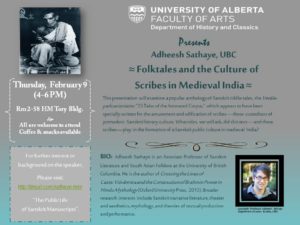 Feb 2017: Folktales and the Culture of Scribes in Medieval India
Feb 2017: Folktales and the Culture of Scribes in Medieval India
Feb 2017: Working With and Across Borders: Symposium
Friday, February 10, 2017, 1:00-5:00PM
3-95, Salter Reading Room, Humanities Centre
Please join this diverse group of scholars and
writers to discuss how borders, hard and soft,
shape our world and our research.
Conversations developing around six featured
presentations will aim to identify intersections
and establish connections across disciplinary,
geographical and temporal boundaries.
No registration required. Come and go as your
schedule permits. ALL WELCOME!
Fall 2017:
A new 100-level course, “History of Science in Ancient and Medieval India” is going through the stages to get on the books for Fall 2017. Put it in your calendar!
Sept 2016: The Department of History and Classics
At the invitation of the Department of History and Classics and the Singhmar Chair in Classical Indian Studies:
Areas, Disciplines, and the Goals of Inquiry
Guest lecture by Prof. Sheldon Pollock, Columbia University, NY.
U of A North Campus, Business building, 16 September 2016, 3pm.
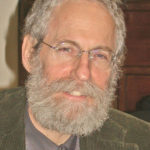
Sept 2016: The Department of East Asian Studies
Fu Hao 傅浩, Chinese Academy of Social Sciences, visiting scholar at U of A.
The Application of Indo-European Classic Grammatical Analysis in the Translation of Classic Chinese Poetry
Since Ezra Pound “invented” Chinese poetry for the English-speaking world, as T. S. Eliot said, using Ernest Fenollosa’s notes of his Japanese tutors’ literal interpretations, the Poundian way of reworking of word-for-word interpretations into logical sentences has been imitated by later generations of translators such as the Poundian scholar Wai-lim Yip, who, however, have more or less neglected the grammatical elements of the words as his predecessors did. Therefore, the first-step interpretations may be misleading and the final results inaccurate. In fact, grammatically, there are much more similarities between classic Chinese and Indo-European languages such as Sanskrit than between modern ones. To apply Sanskrit grammatical analysis to the process of translating classic Chinese poetry into English may result in somewhat better understanding of the original and more accurate renditions.
Thursday, September 15, 3:30-5:00 PM
Pembina Hall 3-04

